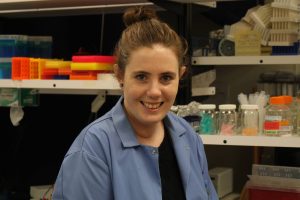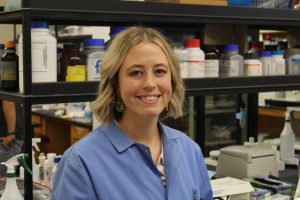Since 1960, the Lalor Foundation has supported promising new researchers through its postdoctoral fellowship program. The foundation has put the focus of its assistance and funding on research in mammalian reproductive biology, and rewarded researchers who are establishing scientific and teaching careers with postdoctoral grants.
During the past three years, two postdoctoral fellows within the University of Missouri (MU) College of Agriculture, Food and Natural Resources (CAFNR) Division of Animal Sciences have earned the prestigious honor – Lauren Hamilton and Harriet Fitzgerald.
Hamilton is a postdoctoral fellow in the lab of Peter Sutovsky, a professor in the Division of Animal Sciences. Fitzgerald is a postdoctoral fellow in the lab of Thomas Spencer, vice chancellor for research and economic development in the MU Office of Research and Economic Development (ORED), and Curators’ Distinguished Professor of Animal Sciences.
Looking for Genetic Mutations
Hamilton received her Lalor Foundation Fellowship in 2021 for a project titled, “Validation of High Impact SNPs Affecting Sperm Development, Function and Fertilization Success.” Using bulls as a model, Hamilton said she is looking for single nucleotide polymorphisms in the genetics of bulls that have been deemed infertile or are low for their inception rates compared to others.
“We’re looking for genetic mutations in these bulls,” she said. “We plan to genetically sequence the bulls and study them to see if there are any distinct defects. Bulls are morphologically very similar to humans in regards to sperm. A lot of the genetic mutations we find in bull are highly relatable to humans. We’re hoping that throughout the project we can identify specific mutations that could then be screened in patients. Bulls have such an extensive fertility record, which is a huge bonus.”

Hamilton completed her undergraduate degree in biological sciences at Queen’s University in Kingston, Ontario, Canada. She also earned her PhD from Queen’s University. It was during her undergraduate studies that Hamilton’s interest in reproductive research really took off. Her passion only grew as she was completing her PhD.
“I was working with rats and mice, as well as bull, human and pig, during my PhD research,” Hamilton said. “I was looking at their molecular biology and doing protein-based studies. The majority of that work was specifically centered around a part of the sperm head.”
Hamilton first met Sutovsky while working on her PhD, as he was a frequent collaborator with Hamilton’s advisor.
“Throughout my PhD, we always wanted to work with larger mammals and Dr. Sutovsky was such a great resource,” Hamilton said. “Every summer, I came down for a month and worked with him. It was a nice introduction, and it has been fantastic working with him full-time now. He is an expert in imaging, which is where a lot of my interest lies. It’s great to learn from the best.”
She said the Lalor Foundation Fellowship will allow her to strengthen the research she’s already interested in.
“Our lab is interested in shedding a bit more light on the male contribution as a whole,” Hamilton said. “A lot of the male infertility issues are very visible, such as the number of sperm or if they swim. This fellowship will allow us investigate even more of the proteins and defects that we uncover.
“I don’t think I really knew how prestigious this fellowship was when I originally applied. It’s super exciting to be part of this elite group.”
Developing Important Models
Fitzgerald earned her Lalor Foundation Fellowship in 2019 for research titled, “Investigations into How Uterine Glands Impact Human Pregnancy Establishment.” Fitzgerald’s project focused on the lining of uterus, called the endometrium. Part of the research centered on her developing a model of the endometrium in vitro that their lab could study.
“Our research focuses on the endometrium, which changes during the menstrual cycle in women,” Fitzgerald said. “We study the uterine glands found in the uterus, and those are really important for the development of the embryo and pregnancy establishment.
“We know in a number of animal models that those animals without uterine glands, the embryo implantation is affected, as well as pregnancy establishment. In women, when secretions from the glands are disrupted, it’s associated with infertility as well. Obviously modeling early pregnancy in women is really difficult. The fellowship allowed me to develop a model of the endometrium in vitro.”

Fitzgerald finished her undergraduate degree at the University of Melbourne in Australia. She earned her PhD from Monash University in Melbourne, Australia.
“I’ve always been fascinated with where we come from,” Fitzgerald said. “I worked on the endometrium while completing my PhD in Australia, and that really interested me as it changes so much every month in women. It’s amazing, but little is really known about it as it’s difficult to study.”
When Fitzgerald had the opportunity to work with Spencer, she jumped at the opportunity.
“He is a world expert in uterine glands and the endometrium,” Fitzgerald said. “That’s why I really wanted to come to the University of Missouri and continue my research. I’m really interested in trying to mimic what we see in women in the lab.”
Fitzgerald said that they obtained endometrium samples from women who consented and were willing to be part of the project. They digested down the tissue and obtained the different cell types. Fitzgerald then cultured those cells from the endometrium and make what are called organoids, which are 3-D structures that are similar to miniature organs.
“Because our passion is studying uterine glands, we decided to establish organoids in our lab so that we could see if they were responsive to hormones and whether we could manipulate them to then create a more representative model of the endometrium,” Fitzgerald said. “Our end goal was combining the organoids with another cell type, which are called stromal cells and are located in the endometrium. We were looking to see and mimic their relationship with one another. We have a number of collaborations ongoing.”
Along with her research, Fitzgerald is also part of the MU Postdoctoral Association (MUPA), which fosters professional development and social interaction to provide community and a collective voice, and to liaison between postdoctoral fellows, faculty and administration. Fitzgerald serves as the finance chair for the association.
“It’s important to represent the postdoctoral community at MU,” Fitzgerald said. “It’s a lot of fun to promote our postdocs so they can showcase their research. It’s a really great group of people. We also have numerous international postdocs, so it’s nice to get to know people in different departments and colleges.”